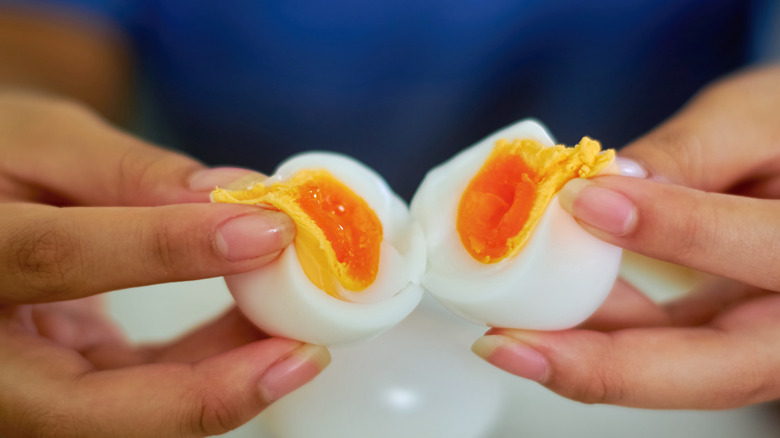The Genius Way Gordon Ramsay Peels His Hard Boiled Eggs
How many ways are there to crack an egg? An infinitum, of course. Some methods work better than others. And when it comes to cracking (and peeling) boiled eggs, professional chef and "MasterChef" judge Gordon Ramsay might just have the best method for perfecting your boiled egg peeling game. In a video posted to Ramsay's YouTube channel, the chef shared his go-to trick for ensuring a great peel. In the video, Ramsay is preparing his delightful take on the Scotch egg, a vital part of which is a boiled egg center. Ramsay advises home cooks to drain boiled eggs immediately after cooking, then rinse with cold water and crack in order to "prevent the yolks turning gray."
Once cracked, Ramsay then cracks the eggs against the side of the pan and then re-submerges them into the cool water. According to Ramsay, this will allow water to "[seep] underneath the shell." As water seeps in, it will help to separate the shell from the white of the egg, allowing for a quick, easy peeling process without any accidental tears or chunks ripped out. Following these steps will ensure your eggs don't overcook and will also produce a perfectly smooth boiled egg, ripe for Scotching, deviling, or even pickling.
More ways to perfect your boiled eggs
Now, Gordon Ramsay isn't the only chef with a few key egg boiling tips. After all, perfecting boiled eggs is more difficult than it looks. Julia Child had a similar trick to Ramsay, advising home cooks to crack freshly boiled eggs before adding to a bowl of water. Child also had a few tips for egg prep before cooking, including piercing the base of your egg before boiling, in order to prevent cracking. Of course, piercing eggs with a pin can be intimidating for many home cooks, seasoned or otherwise. If this is the case, making sure to keep the heat low while cooking is essential. Some cooks even forgo boiling altogether, instead bringing water to a boil, then covering and removing from heat once the eggs are added. This will prevent your eggs from overcooking. Instead, your eggs will cook more slowly and evenly.
As for telling an egg's doneness, you can take a tip from celebrity chef Jacques Pépin and give your egg a twirl. If your egg doesn't turn when twirled, it might not be ready for peeling. You might want to try this, or any of the above tips, next time you make a batch of boiled eggs. They might just be key to leveling up your boiled egg game.

